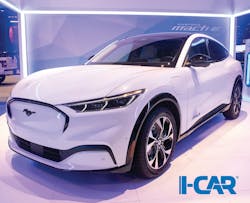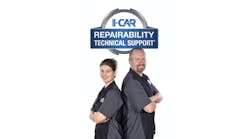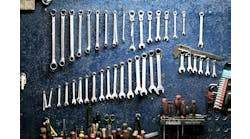Electric vehicles (EVs) are here to stay, and I-CAR is doing everything it can to empower technicians to work confidently with this cutting-edge technology. I-CAR has two EV-specific courses this year (Understanding High Voltage Safety available now) and three more planned for 2021, helping to increase knowledge and confidence for technicians and services advisors when working with EVs.
Jeff Poole (Manager and Subject Matter Expert at I-CAR) has been fascinated with all things electrical since childhood. Through his work at I-CAR, he understands the detailed level of education required to prepare to work on contemporary EV models.
“Electric vehicles are here, they’re gaining popularity and acceptance and their viability grows stronger every day,” Poole says. “Over one hundred years ago, some of the first automobiles were electric. The fundamental principles of electric currents in circuits and magnetic fields applied then and still applies today, but the technology has dramatically improved, particularly in recent years.”
You do not have to have an engineering degree to work around and repair all of the technology and advanced engineering that goes into these vehicles. What Poole and I-CAR recommends is the right knowledge, tools or equipment, and vehicle-specific repair/service information. “If you are knowledgeable and understand something it is much less intimidating,” says Poole.
Poole stresses the importance of adhering to safety precautions and OEM procedures to ensure the safety of the technician, vehicle, facility and the customer upon completion of a repair. Education and resources available at I-CAR (such as the Vehicle and Technology Specific Training™ portfolio and Repairability Technical Support portal) are there to arm technicians when faced with making decisions about what to do with an electric vehicle.
Poole explains, “Repairing electric and hybrid vehicles present dangers due to damage done to a battery pack or damage that may require the removal of a battery pack or other high-voltage components to facilitate other operations during repair. One of I-CAR’s newly published online courses, Understanding High Voltage Safety, explains the risk associated with high-voltage (HV) systems and how to mitigate it.”
I-CAR is collaborating with vehicle makers on specialty training to ensure safety concerns and precautions are addressed in collision repair training. Poole speaks to some of the safety measures designed into the vehicle: “With high voltage comes certain safety risks that must be accounted for, and the designers have employed a variety of onboard monitors to make sure the high voltage goes where it should and more importantly, does not go where it should not.”
A common misconception is that EV and hybrid vehicles are the same, but Poole clarifies that while there are many similarities between hybrid vehicles and pure electric—commonly referred to as battery electric vehicles (BEV)—there are also many differences when it comes to the complexities and nuances of the onboard systems that support the safe operation of the vehicle.
According to Poole, “Like anything you work on, you should understand how it works so that you don’t hurt yourself in the process of repairing it and so you don’t accidentally cause more damage to whatever it is you are fixing.”
In addition, vehicle makers require specific education for repairing hybrid, Plug-in Hybrid Vehicles (PHEV), and BEVs. Recently, Ford announced a 2021 deadline for EV preparedness, and all of Ford’s required courses can be completed online at I-CAR.com. As more consumers move away from gas-powered vehicles for cost-savings or environmental reasons, the education needed to safely repair is more relevant and important than ever.
The future is here, and it’s electrifying. I-CAR is prepared to address the collision repair industry with the technical education needed to succeed, and to energize professional careers for those who choose to pursue it.
To learn more, check out i-car.com, and tell I-CAR about your experience with electric vehicles here!




